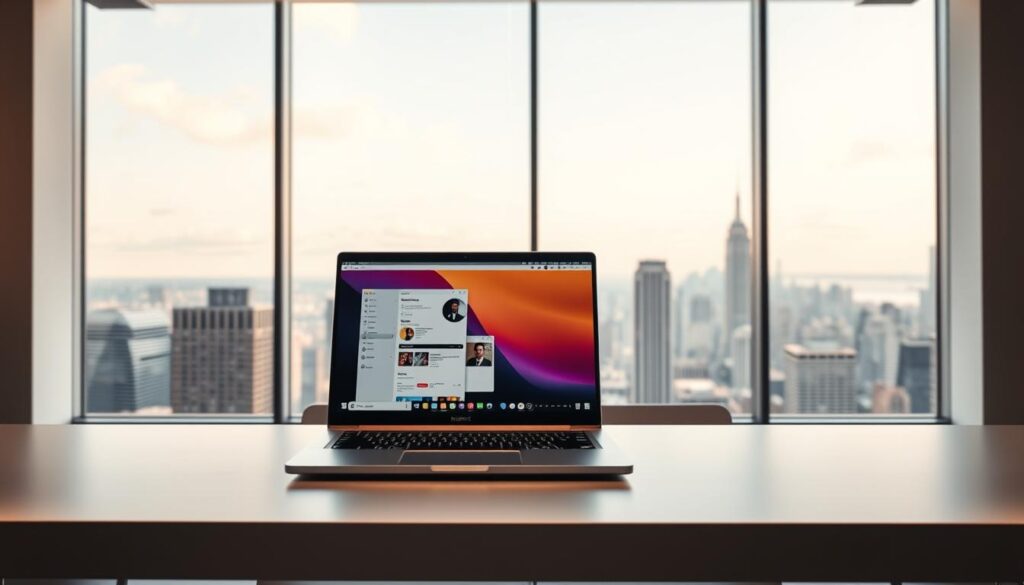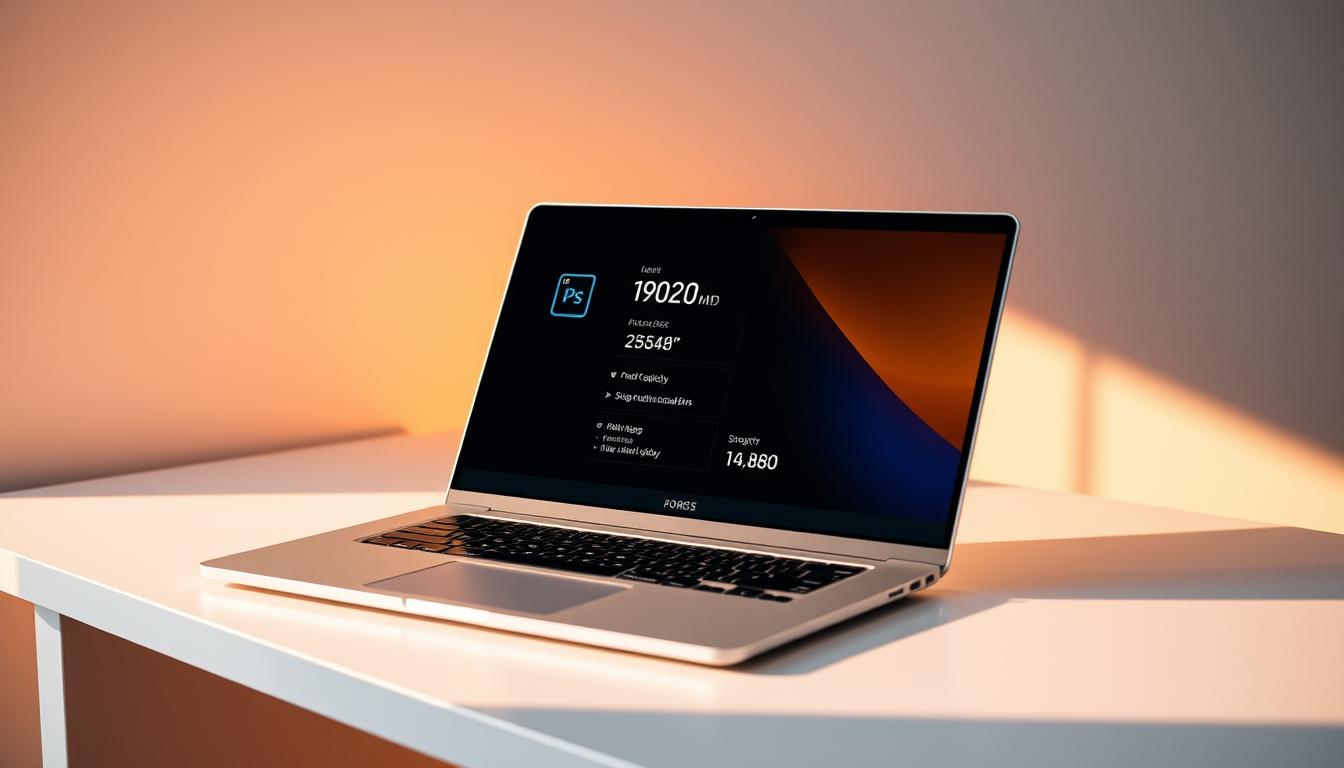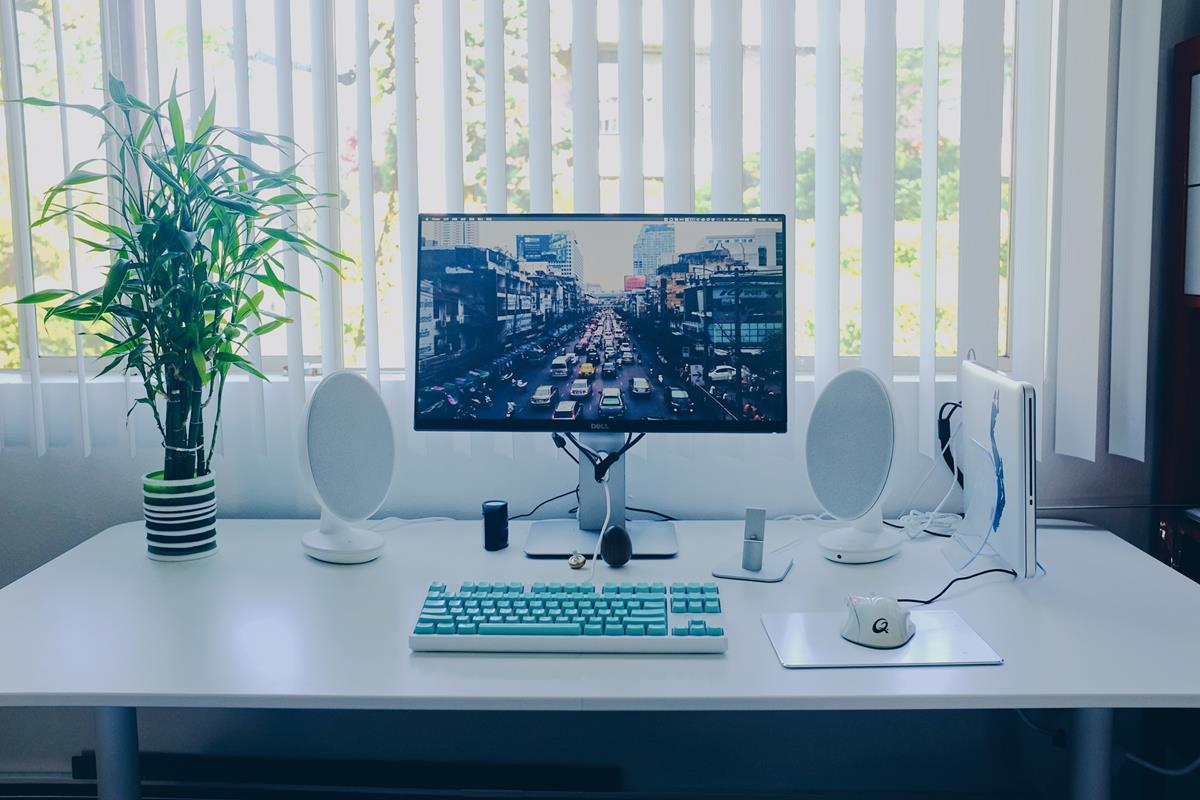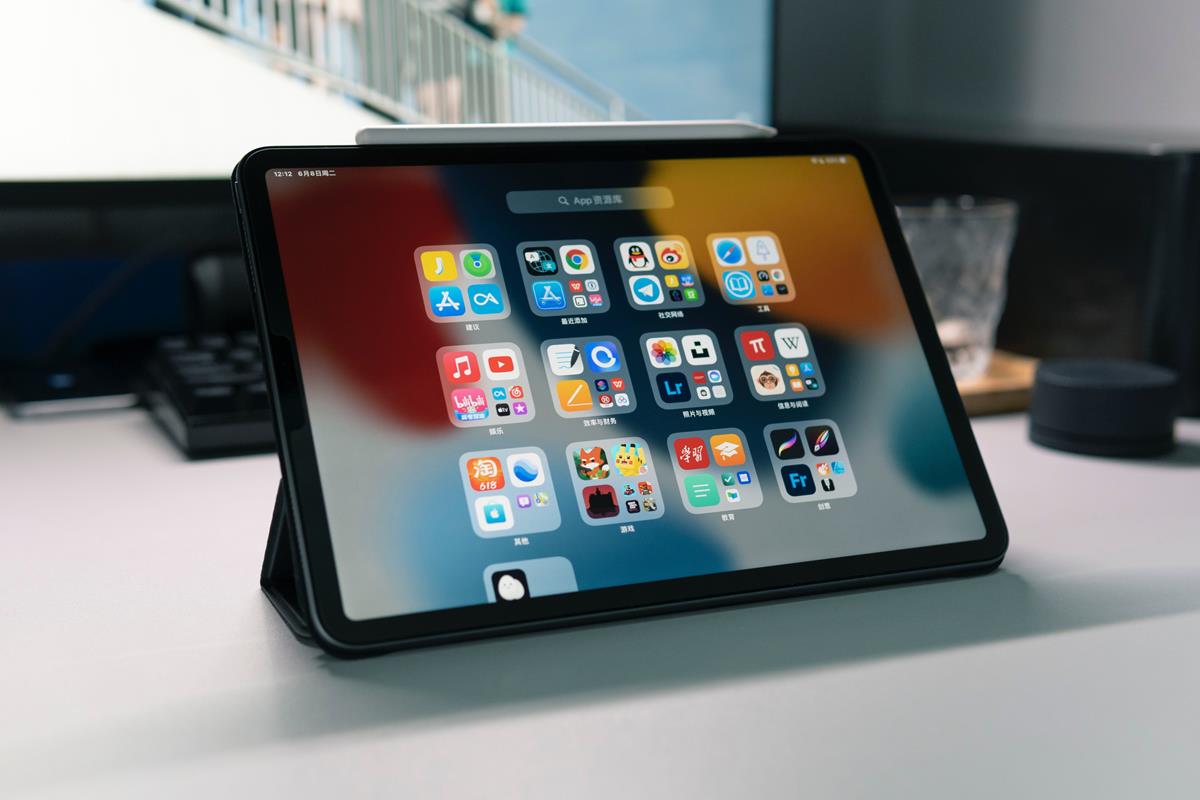More people are working from home now than ever before. Since 2005, the number has grown by 159%. Choosing the right laptop is key for staying productive and comfortable.
A good laptop is very important for remote work. It needs to perform well, have a great display, and last a long time on battery.
When buying a laptop for remote work, think about a few things. Look at the processor speed, how much memory it has, and the display’s quality. These things matter a lot.
Key Takeaways
- Consider laptop performance, display quality, and battery life for remote work.
- Processor speed, memory, and display resolution are key laptop specifications.
- A suitable laptop enhances productivity and comfort in a remote work environment.
- Remote work requires a laptop with a reliable battery life.
- A good display quality is essential for a comfortable working experience.
The Importance of a Quality Laptop for Remote Work
In today’s world, a good laptop is key for remote work. It helps you work better by giving you the power and memory you need. A great laptop also makes sure your work looks good on the screen.
How Your Laptop Affects Daily Productivity
A laptop that fits your work needs can really help you get things done. A strong laptop can do many things at once without slowing down. This means you can finish your work faster.
A good screen also helps. It makes your eyes happy, so you can work longer without feeling tired.

Long-term Investment vs. Short-term Savings
Even though a top-notch laptop costs more at first, it’s worth it. A good laptop lasts longer and needs fewer fixes. This saves you money over time.
| Laptop Quality | Initial Cost | Maintenance Cost (5 years) | Total Cost |
|---|---|---|---|
| Low | $300 | $500 | $800 |
| High | $1,000 | $100 | $1,100 |
The table shows that a high-quality laptop costs more at first. But, it saves you money over five years because it needs less fixing. This makes a strong case for seeing a quality laptop as a smart investment.
“Investing in a quality laptop is investing in your productivity and future.”
Understanding Your Remote Work Needs
It’s important to know what you need for remote work. You should think about what makes you productive and happy at work.
Assessing Your Specific Job Requirements
Start by looking at what your job needs. Jobs are different. For example, a software developer needs a strong computer and lots of storage. A graphic designer wants a laptop with a good screen and colors.
Identifying Software and Application Demands
Then, think about the software you use every day. If you work with big programs like video editing, you need a laptop that can handle it. Check the system needs of your main apps.
Evaluating Your Work Environment and Mobility Needs
Also, think about where you work and how you move. If you stay in one place, a big laptop might be okay. But if you’re always on the go, you need something light and long-lasting.
| Job Requirement | Key Laptop Features |
|---|---|
| Software Development | Powerful processor, ample storage |
| Graphic Design | High-resolution display, color accuracy |
| Video Editing | Multi-core processor, high RAM, dedicated graphics |
By looking at your job, software, and work place, you can pick a laptop that boosts your work and fits your remote work life.
Essential Specifications for Remote Work Laptops
Choosing a laptop for remote work needs the right specs for best performance. The mix of processor, RAM, and storage greatly affects how well you work.
Processor Requirements: Intel vs. AMD Options
The processor is the laptop’s brain, doing all the math. For remote work, you can pick between Intel and AMD processors. Intel processors are reliable and strong, great for tasks needing lots of power. AMD processors are cheaper but still perform well, good for those watching their budget.
RAM Considerations: Minimum 8GB for Multitasking
RAM (Random Access Memory) is key for doing many things at once. For most remote work, 8GB RAM is the minimum. But, if you do lots of tasks at once, look for laptops with 16GB RAM or more.
Storage Options: Why SSDs Are Superior for Remote Work
Storage is also very important, and SSDs (Solid-State Drives) are better than hard drives. SSDs are quick, making your laptop run smoothly. For remote work, an SSD keeps things fast and avoids slow downs.
Storage Capacity Guidelines by Profession
The amount of storage you need depends on your job. Graphic designers and video editors need lots of space (512GB or more) for big files. Writers and programmers can get by with smaller SSDs (256GB or more).
Display Features for Comfortable Remote Work
The display quality of your laptop is key for remote work. It affects your comfort and how well you work. Look for features like anti-glare and blue light filtering to protect your eyes.
Optimal Screen Sizes and Resolutions for Different Jobs
Screen size and resolution vary by job. Graphic designers and video editors need big, high-resolution screens. Writers and programmers might prefer smaller, yet still clear screens.
| Profession | Recommended Screen Size | Recommended Resolution |
|---|---|---|
| Graphic Designers/Video Editors | 15-17 inches | 4K (3840 x 2160) |
| Writers/Programmers | 13-15 inches | Full HD (1920 x 1080) |
Anti-Glare and Blue Light Filtering for Eye Health
Anti-glare and blue light filtering are key for eye health. Anti-glare screens cut down on reflections. Blue light filtering helps prevent eye fatigue.
Color Accuracy Requirements for Creative Professionals
Color accuracy is crucial for creative jobs. Laptops with high color gamut coverage and color calibration show colors accurately. This is vital for photo editing and graphic design.
Choosing a laptop with these display features can boost your comfort and productivity at work.
Battery Life: A Critical Factor for Remote Workers
For remote workers, a laptop’s battery life is key. It’s not just a nice-to-have. It’s essential for staying productive while working from anywhere.
Realistic Battery Expectations by Laptop Class
Different laptops have different battery lives. Ultrabooks, for example, are light and last up to 12 hours. But, gaming laptops might need to be charged in 6-8 hours.
Power Management Strategies for All-Day Performance
Remote workers can save battery life in many ways. Lowering screen brightness and turning off unused devices helps a lot. Also, closing apps you don’t need can save power.
Fast Charging Technology Considerations
Fast charging is a big plus for remote workers. It lets them quickly top up their laptops. Look for laptops with fast charging for a big advantage.
Connectivity Options for Remote Work
For remote work, having good connectivity is key. It helps you stay productive and communicate well. A laptop with strong connectivity is a must.
Essential Ports and Adapters for Your Peripherals
Right ports and adapters are important. They help you connect things like monitors and keyboards. Look for USB-A, USB-C, and HDMI ports. Also, adapters for old devices are useful.
WiFi6 and Bluetooth5.0: Why They Matter
WiFi 6 and Bluetooth 5.0 are new and better. They make your internet faster and more stable. They’re great for remote work.
Docking Station Compatibility for Home Office Setup
A docking station makes your home office better. It adds more ports and options. Make sure your laptop works with it for a better setup.
Think about these options when picking a laptop. It will help you work better and enjoy your job more.
How to Choose the Right Laptop for Remote Work: A Step-by-Step Approach
Choosing a laptop for remote work needs a careful plan. You must think about what you need to do your job well.
Setting a Realistic Budget Based on Work Requirements
First, decide how much you can spend. Think about the tasks you’ll do and the software you’ll use. For example, graphic designers need more power than people who just check email.
Think about these things to set your budget:
- The cost of laptops that meet your needs
- How important portability and battery life are to you
- Any extra features you want, like a touchscreen or 4G
Prioritizing Features According to Your Daily Tasks
After setting your budget, think about what you need most. If you do lots of things at once, focus on RAM and speed. Creative people might need a good display and color accuracy.
Researching Current Models and Reading Professional Reviews
Now, look at the latest laptops and read what experts say. Check out CNET or Laptop Mag for honest reviews. They can help you choose.
Where to Buy: Online vs. In-Store Advantages
Finally, decide where to buy your laptop. Online stores are cheap and easy to get to. But, stores let you see and touch the laptop first.
| Purchase Option | Advantages | Disadvantages |
|---|---|---|
| Online Retailers | Good prices, easy to get | You can’t touch it first |
| In-Store | You can see and touch it | Prices might be higher |
By following these steps, you can pick the perfect laptop for remote work. It will meet your needs and fit your budget.
Operating System Considerations for Remote Workers
The operating system is very important for remote workers. It affects how well you work and if you can use different software. Knowing the good points of each operating system is key when picking a laptop for work from home.
Windows: Versatility and Software Compatibility
Windows is great because it works well with many software programs. It’s also flexible with different computer setups. This means you can find a laptop that meets your needs and budget.
macOS: Integration with Apple Ecosystem
If you use Apple products, macOS is a good choice. It works well with other Apple devices. This makes working from home easier for those who use Apple products all the time.
Chrome OS: Cloud-Based Simplicity for Specific Roles
Chrome OS is best for those who work mostly online. It’s easy to use, safe, and doesn’t cost much. It’s perfect for people who use Google Workspace and other web apps a lot.
When picking an operating system, think about your job, what software you need, and what you prefer. This helps you work better and more efficiently from home.
Security Features for Remote Work Laptops
Remote work is now common. This means laptops need strong security. Data breaches and cyber-attacks are more common. So, laptops for remote work must have good security.
Biometric Authentication Options
Biometric authentication is key. It makes sure only the right people can use the laptop. You can use:
- Fingerprint recognition
- Facial recognition
- Iris scanning
These are safer than old passwords. Apple’s Face ID and Touch ID are great examples.
Hardware Security Features Worth Investing In
Hardware security is vital. Look for these features:
| Feature | Description | Benefit |
|---|---|---|
| Trusted Platform Module (TPM) | A secure chip that stores cryptographic keys | Protects data with hardware-based security |
| Self-Encrypting Drives (SEDs) | Drives that automatically encrypt data | Ensures data is encrypted at rest |
| Physical Kill Switches | A physical switch that disables certain hardware | Provides an additional layer of security against tampering |
VPN Compatibility and Performance Considerations
A VPN is key for remote workers. It keeps data safe. Choose a laptop that works well with your VPN. It should support the latest VPN protocols and not slow down.
“A VPN is essential for securing data transmitted over public networks. When selecting a laptop for remote work, ensure it is compatible with your organization’s VPN solution.”
Top Laptop Models for Remote Workers in 2023
Remote work is getting more common. Finding the best laptops for 2023 is key. There are many laptops for different needs and budgets.
Best MacBooks for Different Remote Work Scenarios
MacBooks are known for being strong and fast. For remote work, the MacBook Air and MacBook Pro are top picks. They are both portable and powerful.
- MacBook Air: Great for everyday work and moving around.
- MacBook Pro: Best for tough tasks like video editing and coding.
Top Windows Laptops from Dell, Lenovo, and HP
Windows laptops have many options for remote workers. Dell, Lenovo, and HP make laptops for various needs.
- Dell XPS: Small but packs a big punch.
- Lenovo ThinkPad: Durable and made for business.
- HP Envy: Good mix of power and price.
Budget-Friendly Options with Premium Features
Now, you can find laptops that are both cheap and feature-rich. Acer and Asus are great for getting a lot for your money.
Performance Benchmarks Comparison
Here’s a look at some top laptops and how they perform:
| Laptop Model | Processor | RAM | Storage | Benchmark Score |
|---|---|---|---|---|
| MacBook Air | Apple M1 | 8GB | 256GB SSD | 7,500 |
| Dell XPS 13 | Intel Core i7 | 16GB | 512GB SSD | 8,200 |
| Lenovo ThinkPad X1 Carbon | Intel Core i5 | 8GB | 256GB SSD | 6,800 |
Specialized Laptops for Different Remote Professions
Different jobs need special laptops. If you work from home, the right laptop is key. It helps you work better and faster.
Developer and Programmer-Focused Machines
Programmers need strong laptops. They need fast processors, lots of RAM, and quick storage. Intel Core i7 or AMD Ryzen 7 processors and 16GB of RAM are best. SSD storage makes things run smoother.
Content Creation Powerhouses for Designers and Editors
Designers and editors need laptops with great displays and strong processors. 4K or UHD displays help with color and detail. Dedicated graphics cards like NVIDIA GeForce boost performance.
Lightweight Options for Digital Nomads and Frequent Travelers
Digital nomads want laptops that are light and last long. Ultrabooks or lightweight laptops are perfect. They’re easy to carry and work well. All-day battery life means you can work without stopping to charge.
Data Analysis and Scientific Computing Requirements
Data analysts and scientists need powerful laptops. They need fast processors, lots of RAM, and cool systems. Multiple core processors and high-capacity RAM (32GB or more) are crucial. External GPU options add extra power.
Choosing the right laptop for remote work is important. Know what your job needs. Pick a laptop that makes you more productive and supports your work.
Conclusion: Making Your Final Decision
Choosing a laptop for remote work is important. You need to think about how well it works, its screen, battery, and safety. This guide helps you find the best laptop for your job.
Think about what you need for your job. Do you make apps, write, or travel a lot? The right laptop can make your work better. This guide will help you pick the best one.
It’s all about finding the right mix of what you need and new tech. This way, you can work well from anywhere.


